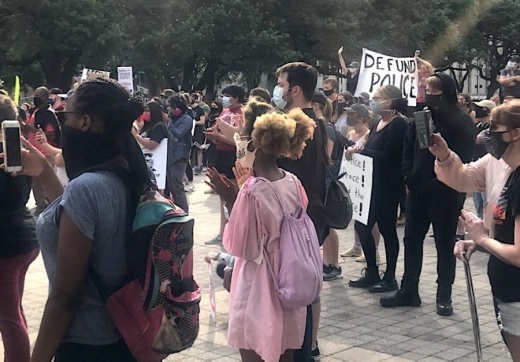The $5.1 billion budget passed with no dissenting votes and no reductions to the $964 million police department budget; that total represents an increase of about $20 million from the fiscal year 2019-20 budget.
A slate of police reform measures proposed by Council Member Letitia Plummer in the form of amendments to the FY 2020-21 budget were not supported by council but rather referred back to the Public Safety Committee for further review.
Plummer’s proposal came after days of nationwide protests against police violence and the death of Houstonian George Floyd; however, she said her staff had been working on them for months.
“I don’t know how much louder people can be,” Plummer said of the push-back. “The fact that George Floyd was laid to rest in our city—I feel like people are looking to Houston.”
The reforms included reallocation of funds set aside for vacant positions toward efforts to strengthen the police oversight board, add a public complaint website, increase unconscious bias training and add more funding for re-entry programs.
Organizers of the rally outside City Hall said they supported Plummer’s amendments as a first step but sought further action to decrease funding allocated toward the Houston Police Department.
“I’m 35 today, and when I started doing this, I was 24, 25 years old,” said Ashton Woods, founder of Black Lives Matter Houston. “And in reality, it’s been the same thing over and over again.”
The funding for the items in Plummer's proposal—$11.4 million redistributed from eliminating 199 vacant positions—was called into question when Plummer said she received conflicting information after she had written the amendment about how many positions were vacant.
Plummer also offered to remove her proposal to require certain de-escalation training measures because Mayor Sylvester Turner planned to include them in an upcoming executive order.
The remaining black members of Houston City Council—not including Plummer—signed a letter June 8 calling for similar measures to those proposed by Plummer, but instead of attaching them to the budget vote, they would be subject to review and public input over 90 days.
“It's not that we do not support some of the elements,” Council Member Carolyn Evans-Shabazz, one of the signers of the letter. “There are people who have been actively engaged, and I don’t think that we as council members have the right to do this without getting those people to the table. ... [We need to] bring in all the people who are chanting out there and everyone else to the table.”
Council Member Edward Pollard proposed an amendment to allocate $100,000 toward an online complaint portal for Houston residents to report incidents with police; this proposal was supported by council but was referred to the legal department for review.
While he said he supported reforms, Turner said he plans to maintain his commitment in the budget to hire five more police officer cadet classes in the upcoming year.
"We've been on the forefront of that," Turner said of police reforms and investment in underserved communities. "It didn't take a police shooting for that to be on our list. It didn't take a police shooting for me to say I will intend to live in the same hood in which I grew up. ... I understand the passion. We're working on that."
Referencing a 2016 audit from independent consulting firm PFM stating that Houston’s police is understaffed as compared to other major U.S. cities, Turner has made hiring more officers a goal during both of his terms.
The police department's budget is dedicated mostly to salaries and benefits to officers. Those terms are negotiated between the Houston Police Officer's Union and the mayor in a separate process. The police contract expires Dec. 31, 2020.





